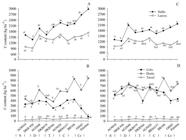ABSTRACT
Changes in quantity and quality of corn crop stover can have a large impact on soil conservation and soil carbon (C) sequestration over large areas. The aim of this study was to evaluate changes in production, concentration and amount of C and nitrogen (N) in corn stover fractions due to cultivar development. Two field experiments were conducted in the city of Rolândia (Paraná State, Brazil) using ten cultivars representing five technological levels: single cross hybrids, double or triple hybrids, commercial varieties, and creole cultivars. Plant heights and stalk, leaf, cob, husk and tassel weights were determined at final harvest. Elemental C and N analyses were performed in triplicate for each stover fraction. In general, the creole cultivars had greater height, more dry matter (kg ha-1) and C content (kg ha-1) in husks, leaves, tassels and stalks, particularly when compared to single cross hybrids or others hybrids. There was a direct relationship between C/N ratio and corn selection for husks in both years and for the others fractions in one study year. This was due to the combined effects of increasing C and decreasing N due to crop selection. Large differences were observed within the same technological levels for the evaluated properties, suggesting a wide variation in genetic background. The quantity and quality of stover fractions vary among cultivars and may affect their use for soil cover, animal feed, biomass energy and other applications.
Index terms:
C/N ratio; genetic breeding; no-tillage system; integrated crop-livestock systems; renewable energy

 Thumbnail
Thumbnail
 Thumbnail
Thumbnail
 Thumbnail
Thumbnail






